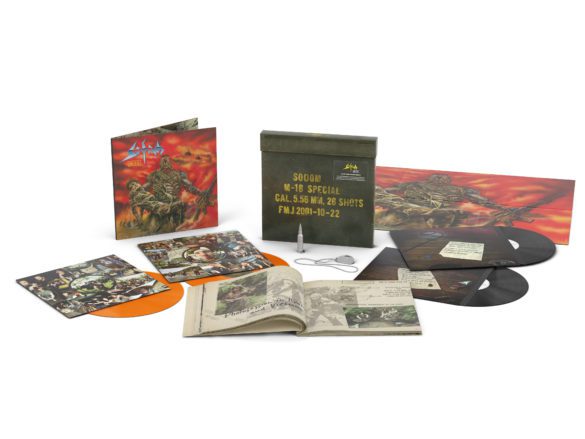
Teutonic thrashers Sodom had the unfortunate luck of a post-9/11 release date for their Vietnam War-themed 10th studio album, M-16, which featured the kind of brutal apocalyptic imagery on the cover that the world wasn’t really in the mood for at that particular point in time. The album was a stunner, however, so re-issuing it 20 years later in a multitude of expanded formats amidst a plague somehow seems fitting.
M-16 is getting the full-on deluxe, remastered treatment from BMG records, which will release it as a 2-disk CD set with a “mediabook;” a 2xLP color vinyl version with archival photos; and the one you really need to get, a 4-LP box set with two additional bootleg live LPs with previously unreleased live versions (recorded in Germany, Thailand, Japan), a USB stick in the shape of a rifle cartridge with all the album songs, a Sodom military ID badge, a poster featuring the cover artwork, plus a 44-page booklet with rare photos and liner notes by Tom Angelripper. All formats include two bonus live tracks recorded in 2001. Presale orders for this December 10 release are available here.
To get the full details about this anniversary edition, Decibel rang Mr. Angelripper on the Zoom phone at his bunker in Germany where he and his fellow countrymen are sheltering in place once again. Though Sodom have German tour dates in December, he suspects they will be cancelled. “It’s very disappointing, the whole situation,” he tells us, “but we keep on going, doing the best we can do. We’re working on re-releases and all that stuff.”
What originally inspired you in 2001 to make an album about the Vietnam War?
When we started writing songs, we never thought about doing a concept album, or whatever. I remember I had six or seven lyrics [for songs] finished for the album, and they were all dealing with Vietnam. So that became the idea. There was so much inspiration and material to write about. I made the decision to do all the songs about the Vietnam War, including the [cover of] “Surfin’ Bird,” which is not a Vietnam song, but it’s from the time. [M-16 is actually] not a concept album. It’s just a Sodom album with lyrics just about Vietnam. In the end I was really satisfied. That was a really good album and the production is very good and everything.
The theme was the Vietnam War, but was there a reason you chose to call it specifically M-16?
For me the M-16 rifle is a symbol of the Vietnam War. I’m really interested in gun history and American guns—I hunt, I collect guns. I’ve always had a special affinity toward guns. I also have an M-16 at home, but it’s just a [replica] air rifle. I think the M-16 was specifically designed by the army to fight in Vietnam, a war in a jungle. But, in the end, they had so many problems with the M-16, because of the chambering and the barrels.
I like [short album] titles, where people don’t know what they are exactly. There were a lot of other good song titles on the album, but M-16 is very, what we say in German, plakativ [striking] and it fits perfect on a cover.
What is it about the Vietnam War specifically that interested you so much ?
I remember when I was a little child and I heard my parents talking about it. I knew that people were going out in the streets in Germany to demonstrate against war, against American politics and all. I couldn’t understand what was really happening at the time. But in 1979, I got a [VHS] video of The Deer Hunter, which was the first Vietnam movie I saw. That was so inspiring to me. I know that was a really bad thing, all the wars, but as a songwriter, and writing lyrics, it’s a very big inspiration.
If you read [my] lyrics, there’s no political opinion [expressed] in the songs, I just describe how bad war is. I didn’t want to describe the political war between two nations; I tried to describe the war of the soldier—one man fighting against another man.
After two previous albums with this lineup—guitarist Bernd “Bernemann” Kost and drummer Bobby Schottkowski—did things seem to be clicking during the writing and recording of M-16?
The first [with that lineup] was ’Til Death Do Us Unite and it was a completely new band. The following album, Code Red, was a typical Sodom album—that was exactly the way we wanted to go for future albums. But M-16 was something special to me because that was the last time we were all in the studio together for three or four weeks as a band, working on an album. Nobody went home. We recorded with Harris Johns in Brandenburg [just outside of Berlin]. He had a small apartment there in the studio, and we stayed there the whole time. After recording sessions in the day, we’d get some drinks and do some barbecuing. It was like being on holiday and recording an album. That was the last time the band was close together in the studio.
Later, that was when digital recording was upcoming, and more studios were getting into digital recording, we were able to record guitars at home, or record at studios near where we lived. So, we would record, and then go back home. But on M-16, we were together the whole time. It was really inspiring and [it] helped also with the friendship. That was really something special. That was the last album we recorded with Harris Johns, because Harris wasn’t at all into digital recording. It was something brand new for him. M-16 was recorded analog and mixed digital—it was a combination of both.
You traveled to SE Asia, including Vietnam, before the record was released. What was that like?
We talked to our record company and told them that we wanted to get more information about the Vietnam War and we wanted to talk to veterans about their experience in the war. Our tour manager and friend, Manni Eisenblätter, who was a photographer and editor for Metal Hammer magazine in Germany, traveled around Asia with us. That was a big experience for me, talking to the people, people [who were wounded by] napalm or Agent Orange. That helped me understand what was the real Vietnam war. And when I came back home, I changed some lyrics to get more to the point.
When we visited Saigon, we tried to organize a show there—that was my dream, to record a live album in Vietnam. There was a club called Apocalypse Now!, a great place for recording, or doing a live show. But the political system in Vietnam never allowed German bands or American bands to play shows. They told our manager that we were too much pro-American. They didn’t want a Western band playing in Vietnam. The metal scene was very small; it was just in the underground. At this time, it was forbidden to have long hair or wear all the metal clothes.
After we finished the album, we went to Bangkok [Thailand] to record a show and do some promotions. The record label flew in 50 journalists from all different countries—America, Russia—to Bangkok just to listen to the new album [M-16]. It was very expensive. [Laughs]

Tell me about some of the bonus material that accompanies the deluxe box set.
Because there were no songs left over from the original M-16 recording session, we talked about [including] some live material. So we thought about what shows we did during this time and used that material for two “bootleg” albums. We played at Wacken in 2001, we played at Bang Your Head [2003] and we played in Japan, and I tried to find some live recordings of them. But it was really hard to get because we couldn’t find multi-track recordings; we just had stereo mixes of mp3 files. So they sound real live, because we couldn’t improve individual tracks. But these performances are something special for the collectors.
You’ve gotta realize that M-16 [when it first came out], wasn’t released on vinyl. It was only released on CD. Record companies stopped doing vinyl because [they thought] nobody had record players, vinyl was dead. I’m not a big fan of re-releases; I always tell fans to get the first pressing, the original one. That’s really something to collect. But the whole [Sodom] back catalog comes from SPV Records to BMG, so we talked about doing something. When I work with a record company on a re-release, I’m gonna spend a lot of time, and I want to put a lot of passion and life in it to get a really good product.
The booklet that comes with it has so many pages and pictures and it tells the whole story of making M-16. It’s amazing. It’s worth every penny. I’m so glad that we have a record company like BMG that’s interested in doing a really good product, not just bring out the re-release to make money. I think they have our back catalog up until 2016, so we’re talking about a re-release every year. Next year we have a 30-year anniversary set of Tapping the Vein—I think that will be the next project. Why not? Right now we have a lot of time to work on it.






